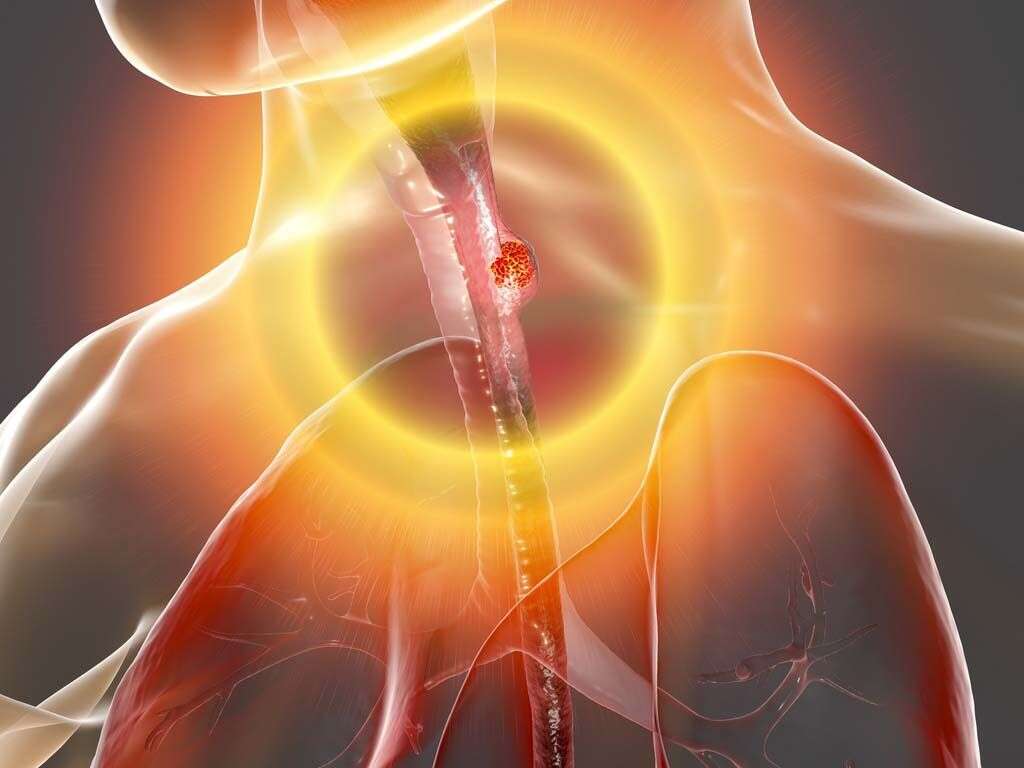10 Esophageal Cancer Symptoms
The esophagus is an 8-inch-long muscular tube that connects the throat with the stomach. It is also known as the food pipe because food passes through it when swallowed. The esophagus runs in front of the spine, and behind the heart and windpipe. Like most organs in the body, the esophagus is susceptible to cancer. In fact, esophageal cancer is the 6th leading cause of death due to cancer and it is the 9th most common cancer in the world.1Muhammad Masab, M. (2020, October 15). Esophageal Cancer. Retrieved November 18, 2020, from https://emedicine.medscape.com/article/277930-overview
The main types of esophageal cancer are squamous cell carcinoma (SCC) and adenocarcinoma. SCC most frequently occurs in the upper and middle thirds of the esophagus, while esophageal adenocarcinoma usually develops in the lower third of the organ. The exact causes of these conditions are not known; however, certain factors may damage DNA and result in cancer. For instance, risk factors for SCC include alcohol consumption, smoking, and diet (i.e. red meats and processed meats). On the other hand, risk factors for adenocarcinoma include gastroesophageal reflux disease and obesity.1Muhammad Masab, M. (2020, October 15). Esophageal Cancer. Retrieved November 18, 2020, from https://emedicine.medscape.com/article/277930-overview
Unfortunately, esophageal cancer does not cause any noticeable signs or symptoms in its early stages. Thus, it is usually diagnosed when the disease is advanced. Gastroenterologists commonly diagnose this condition through an upper endoscopy. Moreover, treatment will largely depend on the type of cancer (SCC or adenocarcinoma) and it will vary according to the staging. If you would like to know more about esophageal cancer, here are 10 possible signs and symptoms of this condition.

1. Difficulty Swallowing
Difficulty swallowing, also known as dysphagia, is the most common symptom of esophageal cancer. In fact, it is one of the first symptoms to appear in this condition1Muhammad Masab, M. (2020, October 15). Esophageal Cancer. Retrieved November 18, 2020, from https://emedicine.medscape.com/article/277930-overview. Unfortunately, it is a sign of locally advanced disease. Thus, any adult complaining of dysphagia will likely require an upper endoscopy and/or a barium swallow study to exclude the presence of esophageal cancer.
Patients who have esophageal cancer initially experience dysphagia to solid foods due to mechanical obstruction. As the disease advances, the dysphagia progresses to liquids. Moreover, dysphagia can be a distressing symptom for many people with this condition, often leading to weight loss, malnutrition, and respiratory complications.

2. Weight Loss
One of the first symptoms of many types of malignant diseases is significant and unexplained weight loss.
Approximately half of the people with esophageal cancer lose weight without trying to. In fact, this is the second most common symptom seen in people with this condition.1Muhammad Masab, M. (2020, October 15). Esophageal Cancer. Retrieved November 18, 2020, from https://emedicine.medscape.com/article/277930-overview
This unintentional weight loss can be attributed to symptoms like dysphagia, which inevitably decreases the amount of food people with esophageal cancer can swallow. In addition, cancer can cause anorexia or an important decrease in appetite that can contribute to weight loss. If you start experiencing unexplained weight loss, be sure to schedule a checkup with your healthcare provider.

3. Hoarseness
Hoarseness or the presence of a scratchy voice that doesn’t go away is a common symptom of esophageal cancer.
Unfortunately, this symptom is a sign that the tumor has advanced beyond the point where it can be surgically resected.
This symptom is caused by the tumor’s invasion of a nerve in the chest that controls your vocal cords: the recurrent laryngeal nerve. This structure is a branch of a bigger nerve known as the vagus nerve and it is located in a groove just between the trachea (windpipe) and the esophagus. This location is what makes the nerve extremely vulnerable to injury in esophageal cancer, resulting in laryngeal nerve palsy.

4. Chest Pain
Chest pain can appear in many forms and it can have a variety of causes. Unfortunately, pain behind the breastbone or in the center of the upper abdomen is another common symptom of esophageal cancer.
People with this condition tend to experience pain or a strong burning sensation in the chest, especially seconds after swallowing or when the food reaches the affected region of the esophagus.
Generally, these manifestations have been present for many months before the patient seeks medical treatment. As the disease progresses, patients can experience persistent chest pain, which is typically unrelated to swallowing. Unfortunately, this might suggest that cancer has spread to surrounding structures (metastasis).

5. Vomiting of Blood
Esophageal cancer may cause gradual bleeding into the esophagus. Hence, people with this condition may experience hematemesis or the vomiting of blood from the upper portion of the gastrointestinal tract.
However, this can be a symptom of many other medical conditions.
In hematemesis, the vomit may either have a brownish (“coffee-ground appearance”) or a bright red color. These characteristics will be dependent on whether the gastric juices were able to come into contact with the blood from the lesion. Although this symptom is rare in esophageal cancer, if it is sudden and severe it must be treated as a medical emergency.

6. Blood in Stools
Esophageal cancer may cause gradual bleeding into the esophagus. Hence, people with this condition may experience blood in stools. However, the presence of blood in our stools may not always be so obvious. In this case, gastrointestinal bleeding can manifest as melena, also known as the passage of tarry, black stools. In most cases, black stools are a sign of upper gastrointestinal bleeding because the hemoglobin in the blood is digested through the rest of the digestive tract by enzymes and intestinal bacteria, turning the resulting stools black.
As a result of chronic bleeding, blood loss in esophageal cancer can result in anemia or a low level of circulating red blood cells. Esophageal cancer typically causes iron-deficiency anemia.

7. Cough
Coughing is the sudden expulsion of air through the airway to clear them of fluids, foreign particles, irritants, and microbes. As mentioned, patients with esophageal cancer commonly experience difficulty swallowing or dysphagia as a symptom. Thus, undigested food, fluids, and stomach acids can be accidentally inhaled into the airway and result in coughing.
Aspiration can result in an acute respiratory infection that affects the lungs (pneumonia), which may also manifest with coughing. Furthermore, severe esophageal cancer can invade the airway (trachea and/or bronchi) and create an abnormal connection between both organs known as a tracheobronchial fistula. As a result of this complication, any content that is ingested will make its way into the airway causing the patient to cough violently.

8. Lymphadenopathy
Lymphadenopathy is a medical term that refers to the swelling of lymph nodes, which are small structures that filter substances from the lymphatic system. They are an important component of our immune system, and, as such, certain immune cells (lymphocytes) complete their maturation process and many other functions within these structures. Importantly, lymphadenopathy is nonspecific. For instance, possible causes of this clinical sign include infections, malignancies, and autoimmune conditions. Hence, pinpointing the cause of lymphadenopathy can be challenging.
In advanced stages of the disease, esophageal cancer can spread to the lymphatic system and cause lymphadenopathies in the neck (laterocervical) and just above the collarbones1Muhammad Masab, M. (2020, October 15). Esophageal Cancer. Retrieved November 18, 2020, from https://emedicine.medscape.com/article/277930-overview. This is a sign that cancer has metastasized or that it has spread from a different body part from where it started.

9. Fatigue
Fatigue is a medical term that can be defined as a pathologic sensation of constant tiredness that is very profound and has no identifiable cause. Additionally, this extreme tiredness generally does not improve with rest. It is a symptom of a variety of medical conditions, including malignancies.
Fatigue is a common symptom of many types of malignancies and esophageal cancer is no exception. Additionally, the chronic blood loss that occurs in this disease can cause anemia, which also causes fatigue. Recall that anemia is a medical condition that involves a reduction in the total number of circulating red blood cells (RBCs). These cells are in charge of transporting oxygen to the tissues, and they carry it within a molecule known as hemoglobin. Specifically, oxygen in hemoglobin is bound by heme, which is an iron-containing molecule. Hence, when chronic gastrointestinal bleeding occurs, excessive loss of body iron can also take place. This explains why esophageal cancer can lead to iron-deficiency anemia and fatigue.

10. Abdominal Pain
Esophageal cancer can cause abdominal pain related to swallowing in the epigastric region, which is located in the center of the upper abdomen just between the margins of the ribs.
Importantly, when esophageal cancer progresses it can also cause pain in the upper left region of the abdomen. Usually, it can be attributed to the spread of cancer to the liver (metastasis), causing a painful enlargement of the organ known as hepatomegaly. Unfortunately, when esophageal cancer metastasizes through the bloodstream and reaches the liver, the esophageal tumor can no longer be successfully resected.











